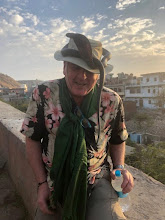I'm just watching a film about a boy who was kidnapped aged 7 and then sexually abused by his captor until he escaped, aged 14. It's a true story.
The boy is so traumatized, not just because what the man has done to him, but because he does have some affection for the man who abused him. This is the problem with the "Helsinki" or "Stockholm" syndrome: victims become attached to their captors because they get to understand them. They have to understand them, as understanding them is essential for their survival.
The boy is so confused, because he feels to some degree that he's actually betrayed the person who's essentially become his adoptive father.
Getting home, he's found that his parents are so alien in nature to what he's become that he can't relate to them, either. His perspective of life is so fundamentally different that he can't cope with the people who demand he be who he used to be. Yet at the same time they feel sympathy and a mix of emotions. That's what abuse does: it has fuzzy edges. If an abuser was just evil and did bad things, it would be so much easier, but that's not the way abusers are.
I'm realising that at the core of recovery from all this is the understanding of an essential self, again, that is independent of everything else. The boy is so fucked up that he can't relate to his parents any more. He's so ashamed, so programmed to be what he's been; he smokes, drinks and does everything else that's unlike who he really is, fundamentally. That's because his core self has turned in on itself. His self esteem has been crushed, and he's become, at least in part, his own enemy.
The thing about such abuses, such crimes, is that they bring out every single peculiarity in oneself. Everything that's shameful or awful or bad or wrong or messed up comes to the surface. There's no hiding. All the shame comes to the surface. And the guilt comes from being a victim, too.
Victims of crimes - whether it's crimes committed by strangers or by their own families - have to escape the shame and guilt they feel. That's the first step in healing.
But the problem is that our society actually protects criminals, if the criminals have power. That's what causes victims to reject the society that they're expected to be a part of. How can a person be anything less than antisocial when he's aware that society isn't supportive of him, and may even be his enemy? I really believe that criminals learn their behaviour by seeing that the society that should be protecting them actually doesn't. How else are they going to behave than antisocial, when they witness an unjust society?
And so, the individual ends up having to play the same game with his society, which he recognises as a combination of friend and enemy. He wears a mask, too, so that he can't be really seen. All the time, the individual has to play a game of cat and mouse, and never really being open about who he really is, deep down inside.
What's fascinating about this particular story is that the boy, Steven Steyner, has an older brother who actually becomes a serial killer himself. This isn't mentioned in the film. The parenst are portrayed as "ordinary", but I wonder what else was going on in the family, that led to one child being kidnapped at age 7 and another child growing up to become a serial killer?
What was going on behind the masks that the family, and everyone else in the story, wore? It's interesting, too, that the movie needed to portray the family as being "nice and ordinary", rather than look for any, deeper truth. I think it's because stories don't have clearly definable edges. Reality doesn't. There is no proscenium arch to reality, nor a frame around it, like a TV has.
I remember someone once telling me that reality is actually far more interesting than fiction. I think there's truth in that.
Sunday, August 14, 2005
Ties to the abuser.
Posted by
Jack Lee
at
10:25 AM
![]()
Subscribe to:
Post Comments (Atom)

No comments:
Post a Comment